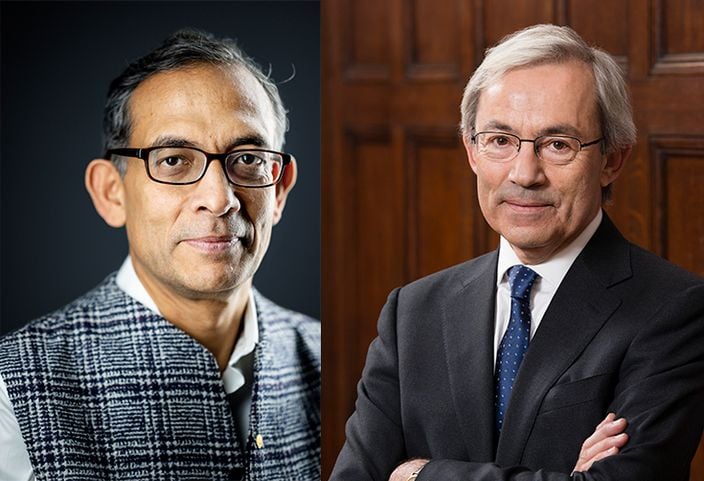As millions around the world try to cope with the disruptions caused by the pandemic, the questions and challenges facing present and future generations of workers are thrown into starker relief. What working life will mean in the future will be discussed together with laureates and experts on 18 and 19 May 2021 at an event titled ‘Nobel Prize Dialogue’. It will be broadcasted from the University of Pretoria (UP). The event, that is free and open for anyone to attend online, has now opened its registration.
Organised by Nobel Prize Outreach and UP, the meeting aims to bring science and society closer and stimulate creative thinking by gathering a unique constellation of Nobel Prize laureates, key opinion leaders, policy makers, students, researchers and the general public. Three economic sciences laureates Christopher Pissarides, Joseph Stiglitz and Abhijit Banerjee will be joined by physics laureate Brian Schmidt and peace prize laureate Muhammad Yunus.
Many questions will be raised during the dialogue, such as: What is the ‘new normal’ for working life? What benefits does diversity bring to the workplace? How does an ageing global population change the labour market? And how is in the COVID-19 pandemic changing the nature of work?
The Nobel Prize Dialogue has been inspired by the Nobel Week Dialogue, which has been taking place in Sweden since 2012 on the day preceding the Nobel Prize award ceremony. Since then, it has been organised in many countries across the world, but this will be the first time it takes place on the African continent.
Professor Tawana Kupe, Vice-Chancellor and Principal of UP, said “partnerships such as the one with the Nobel Prize Outreach help in the sharing and co-creation of knowledge. COVID-19 has meant a change in the way we work, with mental health issues on rise. The workplace is also changing in the face of the Fourth Industrial Revolution.”
“We are very much looking forward to this cooperation with University of Pretoria and the first Nobel Prize Dialogue in Africa”, says Laura Sprechmann, CEO for Nobel Prize Outreach. “We will be joined by five Nobel Prize laureates and several other speakers sharing insights that will help us understand the challenges we are facing for working life in the future.”
Names of the attending laureates
Abhijit Banerjee (prize in economic sciences 2019)
Christopher Pissarides (prize in economic sciences 2010)
Brian Schmidt (physics prize 2011)
Joseph Stiglitz (prize in economic sciences 2001)
Muhammad Yunus (peace prize 2006)
Other speakers include names such as
Dr Akinwumi A. Adesina, President of the African Development Bank Group, Professor Eeva Leinonen from Murdoch University and lawyer Nicky Newton-King, former CEO, Johannesburg Stock Exchange
Register
You can register at: www.nobelprize.org/future-of-work
Media is invited to participate in the meeting.
Interview requests are to be sent to: Primarashni.Gower@up.ac.za
The event will be organized with the kind support from Nobel International Partners 3M, ABB, Ericsson and Scania.
For more information
Primarashni Gower, Public Relations Manager, University of Pretoria
Primarashni.Gower@up.ac.za, 083 2299 011
About the University of Pretoria
The University of Pretoria (UP) is one of the largest contact and residential universities in South Africa, with its administration offices located on the Hatfield Campus, Pretoria. This 112-year-old institution is also the largest producer of research in South Africa.
Spread over seven campuses, it has nine faculties and a business school, the Gordon Institute of Business Science (GIBS). It is the only university in the country that has a Faculty of Veterinary Science which is ranked top in Africa, and overall has 120 academic departments, as well as 92 centres and institutes, accommodating more than 55 000 students and offering about 1 100 study programmes.
UP is one of the top five universities in South Africa, according to the 2019-2020 rankings by the Center for World University Rankings. It is also ranked among the top 100 universities worldwide in three fields of study (veterinary science, theology and law), and among the top 1% in eight fields of study (agricultural sciences, clinical medicine, engineering, environment/ecology, immunology, microbiology, plant and animal sciences and social sciences).
In June 2019, the annual UK Financial Times Executive Education Rankings once again ranked GIBS as the top South African and African business school. The University also has an extensive community engagement programme with approximately 33 000 students involved in community upliftment. Furthermore, UP is building considerable capacities and strengths for the Fourth Industrial Revolution by preparing students for the world beyond university and offering work-readiness and entrepreneurship training to its students.
As one of South Africa’s research-intensive universities, UP launched the Future Africa Campus in March 2019 as a hub for inter- and transdisciplinary research networks within UP and the global research community to maximise 4IR innovation and address the challenges and stresses our continent and world is facing. In addition UP also launched the Javett Art Centre in September 2019 as a driver of transdisciplinary research development between the Humanities and other faculties. In 2020 UP will launch Engineering 4.0. as a hub not only for Smart Cities and Transport, but also to link the vast resources in technology and data sciences to other faculties via Future Africa. These initiatives are stimulating new thinking at the frontier of ‘science for transformation’.
For more information, go to www.up.ac.za
